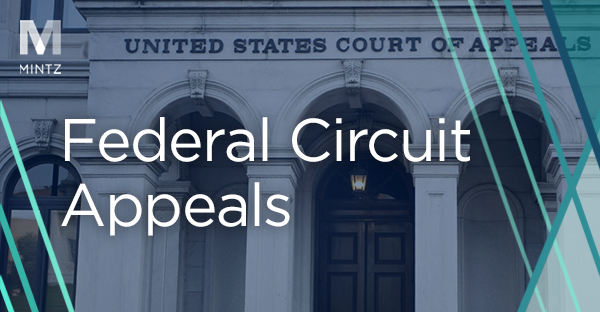
IPRs & Other Post Grant Proceedings
Viewpoints
Filter by:
Patent Owner Tip #6 for Surviving an Instituted IPR: Using Objective Sources & Evidence to Support the Expert Declaration
May 13, 2021 | Blog | By William Meunier, Courtney Herndon
As we have previously discussed, expert testimony is a critical aspect of the Patent Owner’s case-in-chief of an inter partes review (“IPR”) proceeding. In addition to retaining the right expert witness and maximizing that expert’s testimony in the expert declaration, it is imperative that expert testimony is supported by objective, contemporaneous documentary evidence.
Read more
Patent Owner Tip #5 for Surviving An Instituted IPR: The Right Expert Can Save Your Patent
May 6, 2021 | Blog | By Daniel Weinger, Monique Winters Macek
The right expert can be the critical piece that saves the validity of your patent. Finding the right expert for a patent owner requires careful selection and due diligence. We previously detailed how your expert’s testimony can make or break your Patent Owner’s Response (“POR”).
Read more
Patent Owner Tip #4 For Surviving An Instituted IPR: Take the Time to Use Your Expert as an Expert
April 29, 2021 | Blog | By Brad M Scheller, Nana Liu
The expert declaration provides a unique opportunity for Patent Owners to bolster their case during the discovery period of an inter partes review (“IPR”) proceeding. We previously detailed how to effectively use an expert declaration in the Patent Owner’s Preliminary Response (“POPR”). Now we turn to maximizing your expert’s testimony for the Patent Owner’s Response (“POR”).
Read more
Patent Owner Tip #3 for Surviving An Instituted IPR: How Patent Owner Experts Go from Zero to Hero
April 22, 2021 | Blog | By Michael Newman, Courtney Herndon
Drafting the expert declaration is another critical task for Patent Owners during the inter partes review (“IPR”) discovery period. As noted in our previous post, IPR expert witnesses provide declarations as affirmative testimony in lieu of live testimony before the Board at the hearing.
Read more
PTAB Reinforces Uneven Evidentiary Playing Field in IPRs
April 16, 2021 | Blog | By Daniel Weinger, Nana Liu
The U.S. Patent and Trademark Office’s Patent Trial and Appeal Board (PTAB) recently grappled with the admission into evidence of expert deposition testimony that was presumably harmful to the petitioner in an inter partes review (IPR), and barred the testimony from coming into evidence.
Read more
Patent Owner Tip #2 for Surviving An Instituted IPR: Don’t Swing for the Fences in IPR Depositions
April 15, 2021 | Blog | By Peter Cuomo
As discussed in our previous post, one of the most critical tasks for Patent Owners during the Inter Partes Reviews (“IPR”) discovery period is deposing the Petitioner’s expert. Since IPR depositions are treated differently than fact-gathering depositions in district court litigation, a Patent Owner should approach the IPR deposition with different goals.
Read more
Patent Owner Tip #1 For Surviving An Instituted IPR: Approach IPR Depositions Like A Cross-Examination
April 8, 2021 | Blog | By William Meunier, Sean Casey
As a Patent Owner in an instituted Inter Partes Reviews (“IPR”), one of the first and most critical tasks before you is deposing the Petitioner’s witnesses, including its experts. But approaching an IPR deposition like a typical litigation deposition could be a big mistake.
Read more
Good News/Bad News: Patent Owners and Petitioners Both Make Gains in CAFC Uniloc Decision
March 31, 2021 | Blog | By William Meunier, Sean Casey
The Federal Circuit’s recent Uniloc 2017 v. Facebook Inc. decision is a mixed bag of good and bad news for both patent owners and inter partes review petitioners. On the plus side for patent owners (but not for petitioners), the Federal Circuit determined that the so-called “No Appeal” provision does not necessarily apply to 35 U.S.C. § 315(e)(1), and, therefore, a patent owner may still appeal a Patent Trial and Appeal Board determination that a petitioner is not estopped from maintaining an IPR under § 315(e)(1).
Read more
Year in Review: The Most Popular IP Posts of 2020
January 14, 2021 | Blog | By Christina Sperry
As 2021 begins and intellectual property (IP) strategies are being developed for the new year, it is a good time to reflect on what IP issues were prominent in 2020. According to many readers, hot topics included Chinese foreign filing licenses, patenting involving either artificial intelligence (AI) or COVID-19, inter partes review, and attorney fee awards.
Read more
An Informative PTAB Decision on Fintiv Factors
January 8, 2021 | Blog | By Brad M Scheller
The U.S. Patent Trial and Appeal Board (“PTAB”) recently designated its decision in Snap, Inc. v. SRK Technology LLC (§ II.A), IPR2020-00820, Paper 15 (Oct. 21, 2020) (“Snap”) as being informative regarding the Fintiv factors analysis.
Read more
Tip #6 for Avoiding IPR Institution: Advocate Claim Constructions the Petition Ignored
November 16, 2020 | Blog | By Daniel Weinger, Peter Cuomo
Tip #5 for Avoiding IPR Institution: Policing KSR’s motivation requirement for the ‘how’ and ‘why’.
November 12, 2020 | Blog | By Peter Cuomo, Daniel Weinger
Building on Tip #4, one effective way to avoid institution and not address facts is to point out shortcomings in the petition’s application of KSR when asserting motivation to combine for an obviousness analysis. The Patent Trial and Appeal Board (“PTAB”) is an administrative tribunal that frequently encounters proposed grounds that challenged claims are obvious pursuant to 35 U.S.C. ¶103.
Read more
Tip #4 for Avoiding IPR Institution: Don’t Argue Facts
November 9, 2020 | Blog | By Brad M Scheller, Serge Subach
We’ve previously written that the best defense to an IPR challenge is avoiding IPR institution altogether. In addition to the other tips discussed in this series of posts, another strategy for avoiding institution is focusing the Patent Owner’s Preliminary Response (“POPR”) on areas where the Petitioner failed to adequately support its argument.
Read more
Tip #3 for Avoiding IPR Institution: Use Disclaimers Strategically
November 5, 2020 | Blog | By William Meunier, Peter Cuomo
Under U.S. patent law, “No inter partes review will be instituted based on disclaimed claims.” 37 C.F.R. § 42.107(e). And petitioners only need to demonstrate a reasonable likelihood of prevailing with respect to one challenged claim in order to secure a favorable institution from the PTAB. 35 U.S.C. § 314.
Read more
Tip #2 for Avoiding IPR Institution: Focus on a few arguments that will affect all challenged claims
November 2, 2020 | Blog | By Michael Newman, Daniel Weinger
If you are a patent owner facing an inter partes review (“IPR”) or other post-grant review at the Patent Trial and Appeal Board (“PTAB”), your best chance of success is to convince the PTAB not to institute a trial. But that does not mean that you should pack all of your substantive arguments about patentability into your preliminary response.
Read more
Tip #1 for Avoiding IPR Institution: Litigation Venue Selection
October 29, 2020 | Blog | By Daniel Weinger, Michael Newman, Peter Cuomo
Venue selection is a critical component to any patent enforcement strategy, even before the inception of the PTAB as we know it today. Venue now has even greater importance, as the speed of your patent case (i.e. time to trial) and stay statistics will have a direct impact on whether IPRs against your patents will institute in light of the Fintiv factors.
Read more
Avoiding IPR Institution: Your Best Defense to an IPR Challenge
October 27, 2020 | Blog | By Peter Cuomo, William Meunier, Brad M Scheller
The United States Patent and Trademark Office (USPTO) Patent Trial and Appeal Board (PTAB) was once famously referred to by the former chief judge of the Federal Circuit, the honorable Randall Rader, as a patent death squad.
Read more
Fate of PTAB Judges and Decisions Now in Hands of Supreme Court
October 15, 2020 | Blog | By Michael Renaud, William Meunier, Monique Winters Macek
On October 13, 2020, the U.S. Supreme Court granted three petitions for writ of certiorari related to Arthrex v. Smith & Nephew addressing two issues that will determine the fate of PTAB judges and decisions.
Read more
Federal Circuit Reminds PTAB That Short Cuts Are Not Allowed
August 11, 2020 | Blog | By Brad M Scheller
Last month, in a precedential decision, the Federal Circuit vacated-in-part and remanded the Patent Trial and Appeal Board’s (“Board”) obviousness determination regarding Alacritech’s computer networking patent because the Board failed to adequately explain its findings for three of the challenged claims.
Read more
“Anything Goes” – Federal Circuit Says PTAB Can Use Any Means to Knock Out Substitute Claims (Uniloc v. Hulu: Part 2)
July 29, 2020 | Blog | By Brad M Scheller
Yesterday we discussed the Federal Circuit’s decision in Uniloc 2017 LLC v. Hulu, LLC confirming the Board’s authority to review contingent substitute claims after the original claims have been held invalid by a federal court. Today we cover the panel’s ruling that the Board can use any patentability requirement to evaluate and reject proposed substitute claims in an IPR, notwithstanding that originally-petitioned claims in such proceedings can only be challenged under §§ 102 and 103 based on prior patents and printed publications.
Read more
Explore Other Viewpoints:
- Data Centers & Digital Infrastructure
- AI: The Washington Report
- Antitrust
- Appellate
- Arbitration, Mediation & Alternate Dispute Resolution
- Artificial Intelligence
- Awards
- Bankruptcy & Restructuring
- California Land Use
- Cannabis
- Class Action
- Complex Commercial Litigation
- Construction
- Consumer Product Safety
- Corporate Governance (ESG)
- Cross-Border Asset Recovery
- DEI Legal Developments
- Debt Financing
- Direct Investing (M&A)
- Diversity
- EB-5 Financing
- Education & Nonprofits
- Employment
- EnforceMintz
- Environmental (ESG)
- Environmental Enforcement Defense
- Environmental Law
- Environmental, Social, and Corporate Governance (ESG)
- FDA Regulatory
- False Claims Act
- Federal Circuit Appeals
- Financial Institution Litigation
- Government Law
- Growth Equity
- Health Care
- Health Care Compliance, Fraud and Abuse, & Regulatory Counseling
- Health Care Enforcement & Investigations
- Health Care Transactions
- Health Information Privacy & Security
- IP Due Diligence
- IPRs & Other Post Grant Proceedings
- Immigration
- Impacts of a New US Administration
- Insolvency & Creditor Rights Litigation
- Institutional Investor Class Action Recovery
- Insurance & Financial Services
- Insurance Consulting & Risk Management
- Insurance and Reinsurance Problem-Solving & Dispute Resolution
- Intellectual Property
- Investment Funds
- Israel
- Licensing & Technology Transactions
- Life Sciences
- Litigation & Investigations
- M&A Litigation
- ML Strategies
- Medicare, Medicaid and Commercial Coverage & Reimbursement
- Mergers & Acquisitions
- Patent Litigation
- Patent Prosecution & Strategic Counseling
- Pharmacy Benefits and PBM Contracting
- Portfolio Companies
- Privacy & Cybersecurity
- Private Client
- Private Equity
- Pro Bono
- Probate & Fiduciary Litigation
- Products Liability & Complex Tort
- Projects & Infrastructure
- Public Finance
- Real Estate Litigation
- Real Estate Transactions
- Real Estate, Construction & Infrastructure
- Retail & Consumer Products
- Securities & Capital Markets
- Securities Litigation
- Social (ESG)
- Special Purpose Acquisition Company (SPACs)
- Sports & Entertainment
- State Attorneys General
- Strategic IP Monetization & Licensing
- Sustainable Energy & Infrastructure
- Tax
- Technology
- Technology, Communications & Media
- Technology, Communications & Media Litigation
- Trade Secrets
- Trademark & Copyright
- Trademark Litigation
- Unified Patent Court (UPC)
- Value-Based Care
- Venture Capital & Emerging Companies
- White Collar Defense & Government Investigations
- Women's Health and Technology




